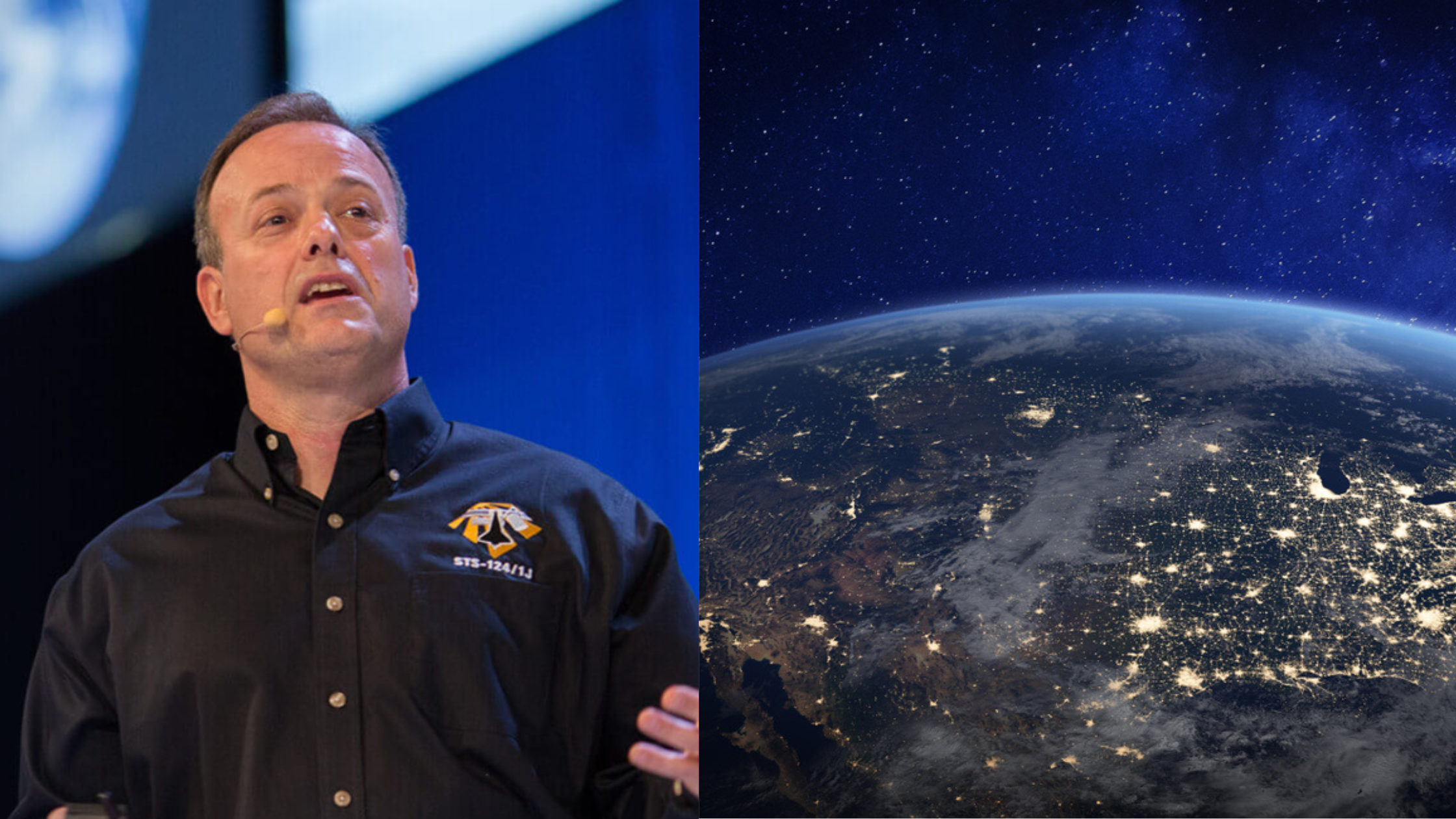After Spending 178 Days In Space, An Astronaut Shares The “BIG LIE” Нe Realized When Viewing The Earth

Looking down at Earth from 250 miles above, astronaut Ron Garan witnessed a perspective that few ever experience. Lightning storms flashed across the surface like bursts of paparazzi cameras, and auroras shimmered in vibrant, otherworldly hues. But beyond the beauty, a deeper truth revealed itself—a sobering realization that would redefine his understanding of life on our planet.
During his 178 days aboard the International Space Station, Garan experienced the “Overview Effect,” a transformative shift in perspective unique to astronauts. From this vantage point, he saw the thin, fragile atmosphere that sustains all life on Earth—a stark reminder of the planet’s vulnerability. It was here that Garan uncovered what he refers to as the “BIG LIE”: humanity’s misplaced priorities, where economic systems are valued more than the very life-support mechanisms of the planet.
The Awe-Inspiring View of Earth
From the International Space Station, Ron Garan’s perspective of Earth was unlike anything most people can imagine. He observed lightning storms illuminating the planet’s surface in fleeting bursts, and vivid auroras sweeping across the atmosphere, so close they felt within reach. These breathtaking sights revealed Earth not as divided continents or nations but as one unified, living entity.
Amid the beauty, Garan couldn’t ignore a stark truth—the thin, fragile layer of atmosphere enveloping the planet. It was barely perceptible, yet it holds the key to life itself. Garan described it as a “paper-thin layer,” emphasizing just how delicate and vital this protective shield is. This realization shifted his focus from the natural wonders to the responsibilities humanity holds toward this fragile biosphere.
In that moment, Garan’s awe transformed into clarity. From above, the priorities of humanity—often dictated by artificial systems like economies—seemed out of alignment with the needs of the Earth. It was from this vantage point that the “BIG LIE” became undeniable.
The “BIG LIE” Unveiled
The Overview Effect is a profound cognitive shift reported by astronauts when they view Earth from space. This experience often evokes a deep sense of awe, interconnectedness, and a reevaluation of one’s relationship with the planet and humanity. Astronaut Ron Garan, reflecting on his time aboard the International Space Station, described it vividly:
“When I looked out the window of the International Space Station, I saw the paparazzi-like flashes of lightning storms, I saw dancing curtains of auroras that seemed so close it was as if we could reach out and touch them.”
This mesmerizing view led to a sobering realization about Earth’s fragility:
“I saw the unbelievable thinness of our planet’s atmosphere. In that moment, I was hit with the sobering realization that that paper-thin layer keeps every living thing on our planet alive.”
Garan’s experience is not unique among astronauts. The term “Overview Effect” was coined by author Frank White in 1987 to describe this phenomenon, characterized by feelings of awe, unity with nature, and a profound sense of interconnectedness.
Studies have sought to understand this transformative experience. Research published in the Psychology of Consciousness suggests that the Overview Effect can lead to self-transcendent experiences, altering astronauts’ perceptions of themselves and their relationship to the broader universe.
 Image source: The European Space Agency website
Image source: The European Space Agency website
Moreover, a study in Virtual Reality explored the neurophysiological aspects of the Overview Effect, indicating that such profound experiences can be associated with specific patterns of brain activity, particularly those linked to awe and self-transcendence.
Garan emphasizes that this shift in perspective reveals the artificiality of many human-made constructs:
“I saw an iridescent biosphere teeming with life. I didn’t see the economy. But since our human-made systems treat everything, including the very life-support systems of our planet, as the wholly owned subsidiary of the global economy, it’s obvious from the vantage point of space that we’re living a lie.”
This realization challenges the conventional prioritization of economic systems over environmental sustainability, urging a reevaluation of our global priorities.
A Reality Check for Humanity
From the vantage point of space, astronaut Ron Garan observed Earth’s beauty juxtaposed with the challenges humanity faces. He noted, “When we see our planet from the perspective of space, certain things become undeniably clear.”
Garan’s reflections highlight the pressing issues of global warming, deforestation, and biodiversity loss. He emphasized that these are not isolated problems but symptoms of a deeper issue: humanity’s failure to see itself as a planetary entity. He stated, “The problem is, that we don’t see ourselves as planetary.”
This perspective aligns with the concept of the Overview Effect, a cognitive shift experienced by astronauts when viewing Earth from space. This effect fosters a sense of interconnectedness and a realization of the planet’s fragility. Garan described it as a “light bulb that pops up where they realize how interconnected and interdependent we all are.”
Studies have explored the psychological impact of the Overview Effect. Research published in Psychology of Consciousness suggests that this experience can lead to self-transcendent emotions, promoting a sense of unity and a desire to protect the Earth.
Garan’s insights serve as a call to action for humanity to adopt a planetary perspective, recognizing our shared responsibility in addressing global challenges. He advocates for a shift from an “us versus them” mindset to one that embraces the “interrelated structure of all reality.”
A Shared Vision for Our Planet
Astronaut Ron Garan’s experiences in space have led him to advocate for a transformative shift in human perspective—what he terms the “Orbital Perspective.” This viewpoint emphasizes the necessity of recognizing our planet as a shared, interconnected home, urging humanity to transcend divisions and collaborate for the common good.
Garan asserts, “Earth is a small town with many neighborhoods in a very big universe.”
This metaphor underscores the importance of global unity and the need to view our planet as a cohesive entity rather than a collection of isolated nations.
The concept of planetary thinking aligns with the framework of planetary boundaries, which identifies critical thresholds in Earth’s environmental systems that should not be crossed to maintain a safe operating space for humanity. Research from the Stockholm Resilience Centre highlights that transgressing these boundaries can lead to irreversible environmental changes, emphasizing the need for sustainable development within these limits.
Studies have demonstrated that adopting a planetary perspective can foster a sense of global responsibility and prompt collective action toward sustainability. For instance, the Planetary Wellbeing Initiative advocates for integrating planetary health into educational curricula, aiming to cultivate a generation that prioritizes ecological balance and sustainability.
Garan emphasizes the power of collaboration in addressing global challenges: “If we adopt the same collaborative mindset and practices that got to the moon and back, and that built the International Space Station, we can alleviate poverty—and do much more.”
A Vision for Earth’s Future
As Ron Garan’s journey into space revealed, Earth is more than just a planet; it is a fragile, interconnected ecosystem teetering on the brink of profound challenges. His insights urge us to rethink our priorities, placing the planet’s well-being above short-term economic gains. Garan’s call for adopting a planetary perspective is not just an astronaut’s philosophical musing—it’s a roadmap for humanity’s survival and growth.
By embracing the Orbital Perspective, we can move beyond divisions, tackle global challenges collaboratively, and create a future that aligns with the interconnected reality of our world. The question remains: will we heed this wake-up call and redefine our path, or will we continue to live the “big lie” that blinds us to the truth of our existence?
This perspective challenges us to think bigger, act together, and cherish the fragile world we all call home. The answers lie not in the heavens but in our collective will to protect the only home we’ve ever known.
Featured image from: Ron Ragan
Loading...






